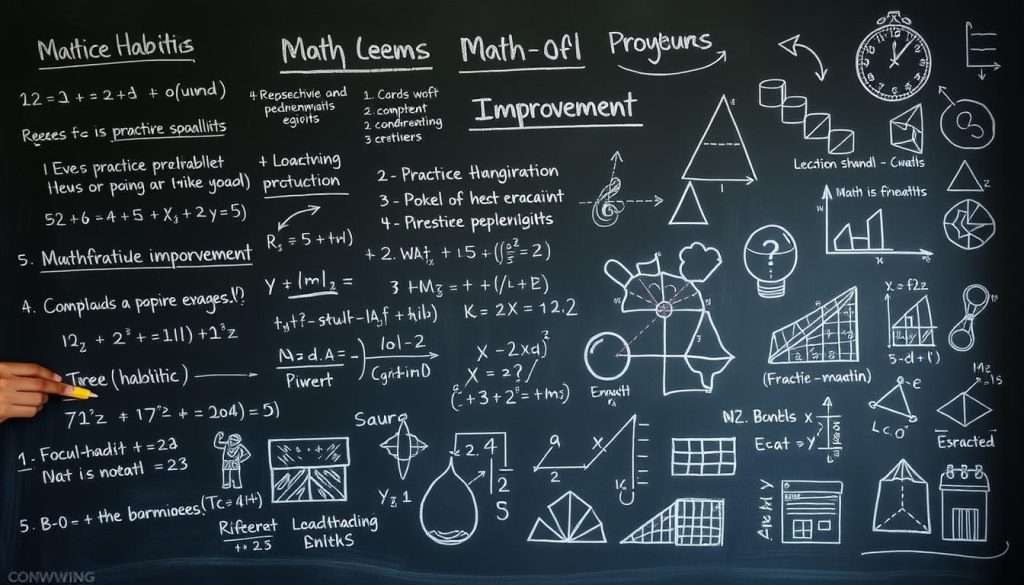Are you tired of struggling with math? You’re not alone! Many students feel overwhelmed by complex equations and formulas. But what if you could improve your math skills and become confident in your abilities?
We’ve seen it happen with over 300,000 students who’ve joined our ConquerMaths platform. They’ve gone from struggling to succeeding. We’re excited to help you do the same!
By the end of this article, you’ll know how to improve your math skills. We’ll share practical tips and insights. They’ll help you conquer your math struggles and achieve your goals.
Key Takeaways
- Discover the secrets to improving your math skills
- Learn how to overcome common math struggles
- Gain confidence in your math abilities
- Explore effective study methods and strategies
- Transform your math experience with our expert tips
The Math Mindset: Why You’re Not Actually “Bad at Math”
Being good at math isn’t just about talent. It’s about having the right mindset. Carol Dweck, a famous psychologist, said, “The view you adopt for yourself profoundly affects the way you lead your life.” This mindset is key for math.
Many believe they’re either “math people” or not. But this belief might be holding us back.
Debunking the Myth of the “Math Person”
The idea that some are naturally good at math is a damaging myth. Studies show math skills come from hard work and the right approach. As
“Math is not about being ‘good’ or ‘bad’ at it; it’s about persistence and understanding.”
This persistence is crucial for conquering math anxiety and success.
How Your Brain Actually Processes Mathematical Concepts
Our brains can learn and change, thanks to neuroplasticity. When we see math as something we can improve, we practice more. This is called deliberate practice, as suggested by Anders Ericsson.
This practice pushes us to do better, leading to big improvements over time.
Adopting a Growth Mindset for Mathematical Success
A growth mindset means we believe our abilities can grow. This is vital for math success strategies. By focusing on the learning process, we enjoy the journey and make progress.
As you start this journey, remember each step is a step towards math confidence building.
Understanding Your Math Anxiety and How to Overcome It
It’s key to understand and beat math anxiety to get better at math. Math anxiety can range from a little worry to a big fear that stops you from solving simple math problems.
Identifying Your Personal Math Trauma Points
To beat math anxiety, find out what makes you anxious. Think about past times that made you feel scared of math. Was it a certain teacher, a bad grade, or a specific problem? Knowing what scares you helps you tackle it.
5 Techniques to Calm Your Mind During Problem-Solving
Here are five ways to calm down while solving math problems:
- Deep Breathing: Breathe slowly and deeply to calm down.
- Positive Self-Talk: Tell yourself positive things.
- Visualization: Picture yourself solving problems well.
- Physical Relaxation: Let go of tight muscles.
- Mindfulness: Stay focused on the moment and the task.
Building Mathematical Confidence Through Small Wins
Building math confidence takes time and starts with small wins. Celebrate every success, no matter how small. As you get better, you’ll feel more confident in solving tough math problems. This confidence will help you conquer math anxiety and boost your math performance.
By understanding your math anxiety and using these tips, you can start to improve your math skills and feel better about math.
How to Get Good at Math (Even If You Think You’re Bad at It)
Getting good at math is a journey. It starts with knowing where you are. It’s about growing and learning. You might think you’re not good at math, but you can get better with the right approach.
Honestly Assessing Your Current Mathematical Abilities
To get better, first, know where you stand. Take a simple math test to see your level. Find out what you’re good at and what you need to work on.
| Math Topic | Current Level | Goal Level |
|---|---|---|
| Algebra | Basic | Intermediate |
| Geometry | Intermediate | Advanced |
| Calculus | Beginner | Basic |
Setting SMART Goals for Math Improvement
After knowing your level, set SMART goals. For example, “I want to improve my algebra by practicing 20 minutes daily for 30 days.” This goal is clear, measurable, and achievable, helping you succeed.
Creating Your Personalized 30-Day Math Improvement Plan
Make a plan for daily math improvement. Start with easy exercises and get harder as you go. Use online tools, practice problems, or apps to help you. Stick to your plan to see your math skills grow.
Improving math skills takes time and effort. But with a good plan and practice, you can reach your goals. Stay motivated and ask for help when needed.
Finding Your Gaps: Identifying What’s Holding You Back
To conquer math, first understand what holds you back. Knowing your weaknesses is key to better math skills and performance.
7 Foundational Concepts Most People Miss
Many students struggle with math due to missing basic concepts. These include fractions, decimals, and percentages. Also, basic algebra and geometry are crucial. People often forget the importance of negative numbers, exponents, and roots.
Having a strong foundation in these areas is essential for math success.

Self-Diagnostic Tests to Pinpoint Your Weaknesses
To find your gaps, assess your current knowledge. Self-diagnostic tests can show where you need to improve. You can find these online or make your own based on key concepts.
By taking these tests, you’ll know your strengths and weaknesses. This helps you focus your study efforts better.
Creating a Targeted Learning Path Based on Your Gaps
After finding your weaknesses, make a learning plan. Set specific goals and plan your study schedule. This way, you can boost your math performance and have a better math mindset.
With regular practice and review, you’ll see big improvements over time.
Effective Learning Strategies for Mathematical Mastery
Mastering math is more than just knowing the concepts. It’s about using strategies that help you remember and apply what you learn. Let’s look at some techniques that really work.
Implementing Spaced Repetition for Long-Term Retention
Spaced repetition is a great way to review material at longer intervals. This helps solidify it in your memory. It’s a key to improving your math skills.
- Better retention: Reviewing at the right times helps avoid forgetting.
- Reduced study time: Focus on what’s about to be forgotten to study more efficiently.
- Improved understanding: Regular review deepens your grasp of math concepts.
The Interleaving Method: Why Mixing Topics Accelerates Learning
The interleaving method mixes different problems or concepts. It might seem slow at first, but it’s actually very effective.
For example, mix algebra with geometry and trigonometry problems. This helps you understand when to use each concept.
Visualization and Modeling Techniques for Abstract Concepts
Visualization is a powerful tool for abstract math. It makes complex concepts easier to understand.
For instance, visualizing function graphs helps you see how they work. This visual aid clarifies complex relationships.
Mental Math Shortcuts That Actually Work
Mental math shortcuts boost your confidence and speed. Techniques like breaking down problems or using approximations are very helpful.
For example, to quickly calculate 16 x 25, break it down into simpler steps. This not only saves time but also improves your mental math skills.
By using these strategies, you’ll get better at math. It’s not just about studying more, but studying smarter.
Practice Makes Progress: Developing a Consistent Math Routine
Making math practice a habit can change your game. Consistency is key to building math confidence and boosting your performance. By adding a regular study routine to your daily schedule, you can build a strong math foundation and improve your skills over time.
Designing a Sustainable 20-Minute Daily Study Habit
To start, it’s essential to design a study habit that is both manageable and sustainable. Allocating 20 minutes each day for math practice can be an effective way to make consistent progress without feeling overwhelmed. Choose a specific time of the day that works best for you, such as during your morning routine or right after lunch.
Here are some tips to help you establish a daily study habit:
- Set a specific and achievable goal for each study session
- Create a conducive learning environment free from distractions
- Use a timer to keep yourself on track and maintain focus
- Review and adjust your study plan regularly to avoid burnout
Balancing Quality and Quantity in Your Practice Sessions
There’s often a debate about whether quality or quantity is more important in practice sessions. The truth is, both are crucial for effective learning. While practicing a large number of problems can help build fluency, focusing on the quality of your practice by understanding the underlying concepts is equally important.
| Practice Aspect | Quality Focus | Quantity Focus |
|---|---|---|
| Understanding | Deep comprehension of concepts | Fluency through repetition |
| Benefits | Improved problem-solving skills | Enhanced retention and automaticity |
Using Progress Journals to Stay Motivated
Keeping a progress journal can be a powerful tool to track your improvement and stay motivated. By regularly recording your achievements, no matter how small, you can visualize your progress and reinforce your commitment to your math goals.
“The progress journal is a reflection of your journey, not just a record of your answers.”
To get the most out of your progress journal, consider including the following:
- A summary of what you studied each day
- Key concepts or formulas you learned
- Challenges you faced and how you overcame them
- Your goals for the next study session
By combining a consistent daily study habit, balanced practice sessions, and the use of a progress journal, you can create a robust system for improving your math skills and achieving your goals.
Using Technology to Accelerate Your Math Learning
In today’s digital age, technology can change the game for math learners. You now have access to many tools that let you learn math at your own pace. You can do it anytime, anywhere.
Top 5 Apps and Websites for Self-Paced Math Learning
Here are some top-rated apps and websites to boost your math skills:
- Khan Academy: A comprehensive platform offering video tutorials and practice exercises.
- Mathway: An app that helps you solve math problems step-by-step.
- IXL: A popular online platform providing interactive math practice.
- CK-12: Offers free online textbooks and interactive math content.
- Desmos: A graphing calculator that helps visualize complex math concepts.
Finding and Engaging with Supportive Online Math Communities
Joining online communities can keep you motivated and help when you’re stuck. Some popular forums include:
- Reddit’s r/learnmath: A community of learners sharing resources and advice.
- Stack Exchange’s Mathematics: A Q&A platform for math enthusiasts.
Leveraging AI Tools to Enhance Your Understanding
AI-powered tools offer personalized learning experiences and real-time feedback. For example, AI-based math apps can:
- Identify your strengths and weaknesses.
- Offer customized practice exercises.
- Provide instant feedback on your progress.
By embracing these technologies, you can significantly improve your math skills. This will help you succeed in your math journey.
Making Math Relevant: Connecting Concepts to Real Life
When we link math to real life, it’s more than a subject. It’s a tool for everyday life. By making math connect to our daily experiences, we find it more interesting and useful.
Spotting Mathematical Patterns in Everyday Situations
Math is everywhere. We see patterns in nature, buildings, and our daily plans. For example, the Fibonacci sequence shows up in leaf patterns and tree branches. Seeing these patterns helps us see math’s beauty and usefulness.
Practical Projects That Reinforce Mathematical Thinking
Doing practical projects helps us think mathematically. Activities like planning a trip budget, figuring out a recipe cost, or measuring for DIY projects make math real and useful.
How to Explain Complex Math Concepts to Yourself
To understand complex math, break it down into simple parts. Use analogies and real-life examples. For example, algebra is like solving a puzzle to find the missing piece.
| Math Concept | Real-Life Application |
|---|---|
| Geometry | Designing a garden layout |
| Algebra | Calculating expenses |
| Statistics | Analyzing sports data |

Working Through Frustration: What to Do When You’re Stuck
We’ve all been there – staring at a math problem, feeling completely stuck. But there are ways to break through. Frustration is a natural response when tackling challenging math concepts, and it’s not insurmountable. The key is to distinguish between productive struggle and harmful frustration.
Distinguishing Between Productive Struggle and Harmful Frustration
Productive struggle is when you’re challenged but still making progress, even if it’s slow. Harmful frustration, on the other hand, is when you’re so stuck that you feel like giving up. Recognizing the difference is crucial to conquering math anxiety.
| Characteristics | Productive Struggle | Harmful Frustration |
|---|---|---|
| Emotional State | Challenged but engaged | Overwhelmed and demotivated |
| Progress | Making slow but steady progress | Little to no progress |
| Response | Seeking help or taking a break | Giving up or avoiding the task |
The 4-Step Problem-Solving Framework That Breaks Mental Blocks
To boost math performance, try this 4-step framework:
- Step 1: Read the problem carefully, identifying key elements.
- Step 2: Break down the problem into smaller, manageable parts.
- Step 3: Apply relevant math concepts or formulas.
- Step 4: Check your work and reflect on the process.
When and How to Seek Help Without Giving Up
Knowing when to seek help is crucial. If you’re consistently struggling with a concept, don’t hesitate to reach out to teachers, classmates, or online resources. This proactive approach is part of effective math success strategies.
By adopting these strategies, you’ll not only overcome frustration but also enhance your math skills. You’ll build confidence and a growth mindset.
From Basic to Advanced: Progression Strategies for Long-Term Success
As you move forward in math, it’s key to balance learning the basics and exploring advanced topics. Improving in math takes time and a smart plan.
Building Your Mathematical Foundation One Concept at a Time
To improve your math skills, start with one concept at a time. This method ensures you grasp the basics well. It makes learning more complex topics easier later.
For example, in algebra, begin with simple equations and then tackle harder ones. This gradual learning boosts your confidence and solidifies your math knowledge.
Creating Bridges Between Different Mathematical Areas
Math is a network of connected concepts, not separate topics. To become proficient, seeing how different areas link is vital.
| Mathematical Area | Connection to Other Areas |
|---|---|
| Algebra | Used in geometry to solve equations, in calculus to model functions |
| Geometry | Applied in trigonometry to understand spatial relationships, in calculus to visualize complex shapes |
| Calculus | Builds upon algebra and geometry to analyze rates of change and accumulation |
Understanding these connections gives you a broader view of math. It helps you solve real-world problems better.
Recognizing When You’re Ready to Tackle More Advanced Topics
Knowing when to tackle harder material is crucial. Check if you can apply math concepts in various ways.
“Mathematics is not about numbers, equations, computations, or algorithms: it is about understanding.” – William Paul Thurston
This quote shows the value of understanding over just memorizing. When you’re sure you can apply math concepts, it’s time for more advanced topics.
Conclusion: Your Journey to Mathematical Confidence
We’ve looked at ways to beat math anxiety and succeed in math. By adopting a growth mindset and identifying your weak spots, you’re on the right path. Creating a learning plan tailored to you will also help build your confidence.
Remember, practice is essential. Being consistent helps build a strong math foundation. Use apps, online groups, and AI tools to improve your skills and stay motivated.
Linking math to everyday life and celebrating small victories helps you overcome frustration. You’re not alone; with the right mindset and support, you can master math.
Now, start your journey to overcome math anxiety and build confidence. With persistence and the right strategy, solving complex problems will become second nature.

